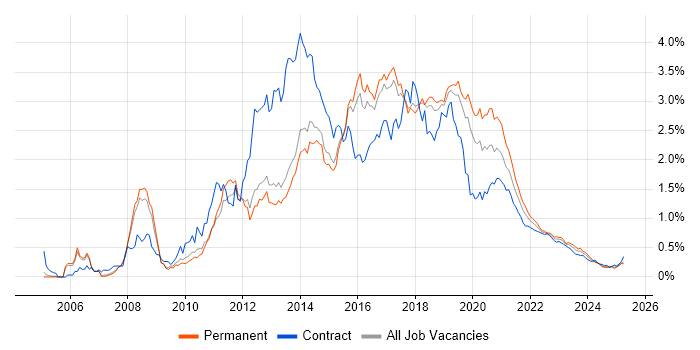JavaScript Developer
UK > Work from Home
The median JavaScript Developer salary for remote or hybrid work is £55,000 per year, according to job vacancies posted during the 6 months leading to 1 May 2025.
The table below provides salary benchmarking and summary statistics, comparing them to the same period in the previous two years.
|
|
6 months to
1 May 2025 |
Same period 2024 |
Same period 2023 |
| Rank |
364 |
481 |
412 |
| Rank change year-on-year |
+117 |
-69 |
-86 |
| Permanent jobs requiring a JavaScript Developer |
33 |
111 |
283 |
| As % of all permanent jobs with a WFH option |
0.22% |
0.33% |
0.66% |
| As % of the Job Titles category |
0.24% |
0.34% |
0.69% |
| Number of salaries quoted |
29 |
102 |
261 |
| 10th Percentile |
£28,950 |
£37,500 |
£42,500 |
| 25th Percentile |
£37,500 |
£50,000 |
£50,000 |
| Median annual salary (50th Percentile) |
£55,000 |
£60,000 |
£70,000 |
| Median % change year-on-year |
-8.33% |
-14.29% |
+16.67% |
| 75th Percentile |
£71,500 |
£75,000 |
£93,750 |
| 90th Percentile |
£81,500 |
£95,000 |
£115,000 |
| UK median annual salary |
£55,000 |
£60,000 |
£70,000 |
| % change year-on-year |
-8.33% |
-14.29% |
+16.67% |
For comparison with the information above, the following table provides summary statistics for all permanent IT job vacancies with WFH or hybrid options. Most job vacancies include a discernible job title that can be normalized. As such, the figures in the second row provide an indication of the number of permanent jobs in our overall sample.
| Permanent vacancies in Work from Home with a recognized job title |
13,554 |
32,482 |
41,080 |
| % of permanent jobs with a recognized job title |
90.64% |
95.99% |
96.08% |
| Number of salaries quoted |
9,860 |
24,960 |
29,208 |
| 10th Percentile |
£30,000 |
£33,000 |
£36,500 |
| 25th Percentile |
£43,750 |
£42,500 |
£47,250 |
| Median annual salary (50th Percentile) |
£60,000 |
£56,000 |
£62,500 |
| Median % change year-on-year |
+7.14% |
-10.40% |
+4.17% |
| 75th Percentile |
£77,500 |
£75,000 |
£81,250 |
| 90th Percentile |
£100,000 |
£92,500 |
£100,000 |
| UK median annual salary |
£57,500 |
£52,777 |
£60,000 |
| % change year-on-year |
+8.95% |
-12.04% |
- |

